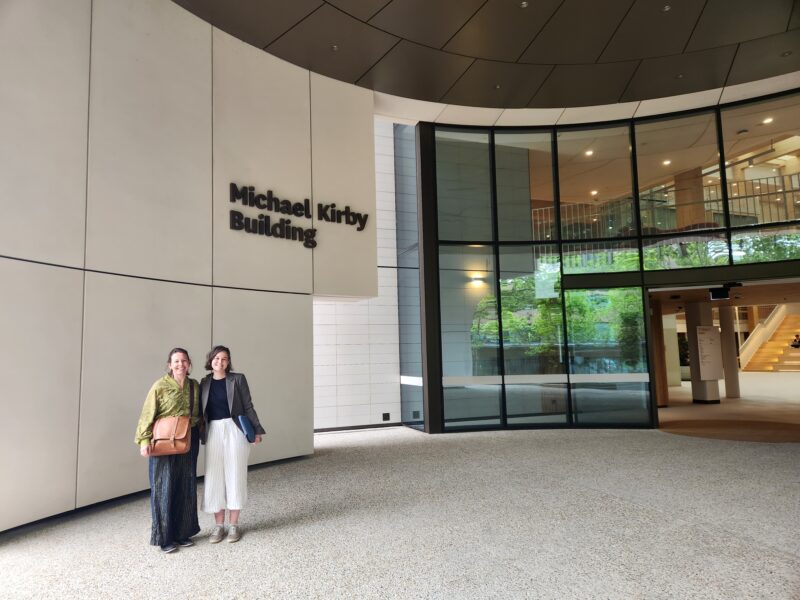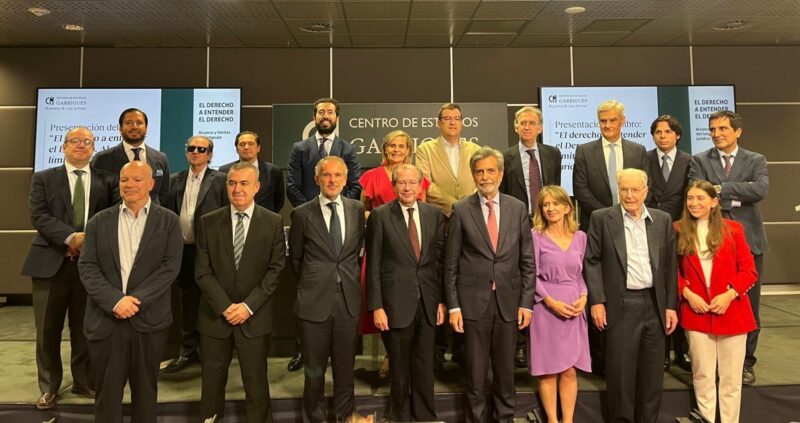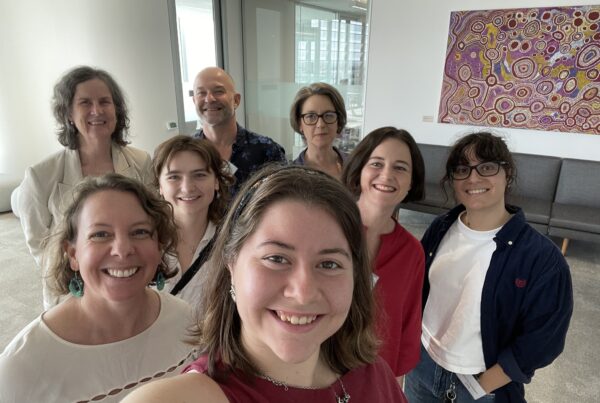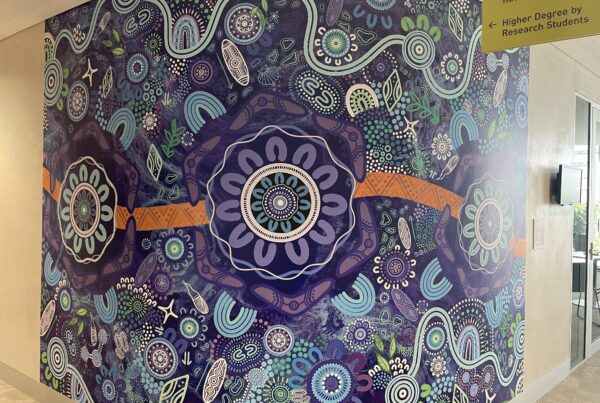The Law and Linguistics Interdisciplinary Researchers’ Network (LLIRN) came into being in 2019, after an initial symposium involving a group of academics and students, mainly from Australian universities, whose research is interested in the various intersections of language and law. One of the symposium’s key goals was to learn more about each other’s work and create new opportunities to collaborate.
Six years later, the LLIRN has grown and we’ve held events, published a law journal special issue that showcased the work of several of our (mainly early career) members, and maintain a lively and growing mailing list, now with members from at least 43 different countries, at diverse stages of their careers, including students, academics, language and legal professionals, and those in policy and decision-making roles.
Since the Network’s inception, one key area of concern is how best we can work – individually and as a community – to integrate law and language expertise in various educational and training contexts, be it working with students in schools or universities, or with professionals in legal settings.
In 2024, we set up a blog series to learn (or “LLIRN”) more about each other, and to make our learning public so that others can learn more about us too. In this latest post, we provide a snapshot of some our Network’s activities related to education. We conceive this theme broadly to include both people who have done research in an educational context, where there is a focus on language and law, and also those who have integrated a language and law focus into education or training that they have designed or delivered, whether in a university or beyond.
This post features LLIRN members from Australia and overseas, working across 11 universities and multiple disciplines.
Donna Butorac, Curtin University, Australia
Donna Butorac coordinates and teaches into the BA major in Anthropology and Sociology at Curtin University. She shares this reflection on how participation in the LLIRN has influenced her teaching:
“I was inspired by what I learned at the excellent Linguistics and Law symposium convened by Alex and Laura at Sydney Uni in 2019 to create a topic titled Language and the Law for my second-year core unit Language and Social Life. The topic introduces some of the ways that language ideology and language use are embedded in the framing and functioning of the Law, explores communication between legal professionals and lay people in legal settings as a form of intercultural (mis)communication, discusses folk linguistics and false beliefs about language as they impact courtroom trials and asylum review hearings, and examines misperceptions about language use, dynamics of power and social inequality involving language use as they play out in specific legal and institutional settings. The lecture covers research by Diana Eades, Susan Ehrlich, Helen Fraser, John Gibbons, Christoph Hafner, Elizabeth Holt and Alison Johnson, Katrijn Maryns, Laura Smith-Khan, and Joseph van Buuren, and in tutorials we discuss some of this research and get students to engage with Helen Fraser’s materials on the Forensic Transcription website. I love teaching the Language and the Law content and it’s proved quite an eye-opener for our students, making a much-valued contribution to the Language and Social Life curriculum.”
Publications
Ingrid Piller, Donna Butorac, Emily Farrell, Loy Lising, Shiva Motaghi-Tabari and Vera Williams Tetteh (2024) Life in a New Language (Oxford)
The Forensic Stream, Speech and Language Lab, Australian National University, Australia
The Forensic Stream of the Speech and Language Lab at ANU conducts research focused on the forensic analysis of linguistic evidence and related areas, and offers courses within the Forensic Linguistics program. These courses include LING2105, Language and the Law, and LING3032, Forensic Voice and Text Comparison. We are also keen to host highly motivated postgraduate students working on topics relevant to our lab. Please contact LLIRN member and Forensic Stream Leader, Professor Shunichi Ishihara for more details.

Dr Alexandra Grey and Dr Laura Smith-Khan, Macquarie Law School
Alexandra Grey, University of Technology Sydney
Dr Alexandra Grey combines legal and linguistic research approaches to study how governments respond to linguistic diversity, and how those responses redistribute or entrench hierarchies of power, access to resources and social groupings. This often includes studying the place of minority languages in education.
Some of her recent work analyses changes in law and language-in-education policy for preschools and schools in China (Grey and Baioud 2021; Grey 2025). Her (2025) review essay on ‘The Handbook of Linguistic Human Rights’ canvasses multiple chapters on education rights and practices around the world. With LLIRN co-founder, Dr Laura Smith-Khan, she has examined the limited inclusion of linguistic concepts and linguistic research in legal studies in Australia, as a stepping stone to potential curriculum reform (Grey and Smith-Khan 2021b). Together, they have also mapped law-and-linguistics research around the legislature, executive and judiciary, to assist non-linguists and legal practitioners navigate the field (Grey and Smith-Khan 2021a). One of Alex’s earliest studies evaluated a bilingual, NGO-led clinical legal education model (Grey 2020).
Alex’s current research focuses on self-determination and the role of governments in Aboriginal language renewal in New Soth Wales (NSW), the most populous state in Australia. She was part of the Indigenous-led team authoring The Benefits of Aboriginal Language Use and Revival – Literature Review for the NSW Aboriginal Languages Trust in 2021; this public resource includes a section on the educational benefits of Aboriginal language renewal in NSW. Alex is especially interested in collaborations with First Nations scholars in Taiwan, NZ and Canada, and in collaborations about interdisciplinary methods.
Relevant publications:
Smith-Khan, L. and Grey, A. (2020) ‘Reflections on developing research collaborations across law and linguistics’, Journal & Proceedings of the Royal Society of NSW 152(3). 332–337. ISSN 0035-9173/18/020332-06
Grey, A. (2020) [Open Access]. ‘The value of participant feedback: Insights from learners in a novel, non-university CLE setting in China, International Journal of Clinical Legal Education. 27(2). 5-67. https://doi.org/10.19164/ijcle.v27i2.959.
Thorpe, K., Booker, L., Grey, A., Rigney, D. and Galassi, M. (2021) [Open Access]. The Benefits of Aboriginal Language Use and Revival – Literature Review. UTS Jumbunna Institute of Indigenous Education and Research. https://www.alt.nsw.gov.au/assets/Uploads/downloads/files/The-Benefits-of-Aboriginal-Language-Use-and-Revival-in-New-South-Wales-Literature-Review.pdf
Grey, A. and Baioud, G. (2021) [Open Access]. ‘Education Reforms Aim to Mold Model Citizens from Preschool in the PRC’. China Brief. 21 (17) 23-29. The Jamestown Foundation: Washington. https://jamestown.org/program/educational-reforms-aim-to-mold-model-citizens-from-preschool-in-the-prc/
Grey, A. and Smith-Khan, L. (2021a). ‘Bringing linguistic research into legal scholarship and practice’. Alternative Law Journal 46(1). 64-70. https://doi.org/10.1177/1037969X20962830
Grey, A. and Smith-Khan, L. (2021b). ‘Linguistic diversity as a challenge and an opportunity for improved legal policy’. Griffith Law Review 30(1). 1-17. https://doi.org/10.1080/10383441.2021.1996883
Grey, A. (forthcoming 2025) [Review Essay, Open Access]. ‘The Handbook of Linguistic Human Rights (Skutnabb-Kangas, Tove and Phillipson, Robert (eds). 2023. Wiley Blackwell. Pp712 + viii)’. Sociolinguistic Studies, issue 19.1. https://utppublishing.com/journal/ss
Grey, A. (2025) [Open Access]. China’s official common language gains further strength against minority languages. Melbourne Asia Review, Edition 21 https://www.melbourneasiareview.edu.au/chinas-official-common-language-gains-further-strength-against-minority-languages/. (Also available in Chinese, 中文: 中国的官方通用语言面对少数民族语言的优势更为显著 https://www.melbourneasiareview.edu.au/中国的官方通用语言在少数民族语言面前进一步强/
Sandra Hale, University of New South Wales, Australia
Professor Sandra Hale is convenor of the Interpreting and Translation programs at the University of New South Wales where she teaches the course Interpreting in Legal Settings, which delves into the language of police interviews, tribunal hearings and court hearings and trials with interpreters. She has been training judicial officers and tribunal members on working effectively with interpreters for over 20 years. She has also delivered professional development on the language of the law and legal interpreting to interpreting practitioners through the Australian Institute of Interpreters and Translators (AUSIT). She has been invited to speak on this topic at numerous conferences for legal professionals, interpreting professionals and linguists. Her research has included assessing the effectiveness of training.
Publications
Napier, J., Russell, D., Hale, S., Spencer, D., & San Roque, M. (2022). Training legal interpreters to work with deaf jurors. In J. L. Brunson (Ed.), Legal Interpreting: Teaching, Research and Practice (pp. 246-281). Washington D.C.: Gallaudet University Press.
Hale, S. (2021). The need to raise the bar. Court interpreters as specialized experts, in M. Coulthard, A. May and R. Sousa-Silva (eds.). Handbook of Forensic Linguistics, 2nd Edition. London & NY: Routledge (pp 484-501).
Hale, S. (2019). Specialist legal interpreters for a fairer justice system. In S. Faiq (Ed.), Discourse in Translation (1st ed., pp. 47-66). Oxford & NY: Routledge.
Hale, S. (2015). Approaching the Bench: Teaching Magistrates and Judges how to work effectively with interpreters. MonTI. Monografías de Traducción e Interpretación, 7, 163-180.
Hale, S., & Ozolins, U. (2014). Monolingual short courses for language-specific accreditation: can they work? A Sydney experience. The Interpreter and Translation Trainer, 8(2), 1-23. doi: 10.1080/1750399X.2014.929371
Hale, S. (2004/2010). The discourse of court interpreting. Discourse practices of the law, the witness and the interpreter. Amsterdam/Philadelphia: John Benjamins. http://benjamins.com/#catalog/books/btl.52/main

Spanish Supreme Court judge, Ignacio Sancho Gargallo and his co-author Dr Ricardo-María Jiménez-Yáñez (UIC Barcelona) (both middle back) with Antonio Garrigues, Fernando Vives, Mercedes de Prada (both in front) and judges, scholars and writers, celebrating the launch of the book “El derecho a entender el Derecho.”
Ricardo Jiménez-Yáñez
Professor Ricardo Jiménez-Yáñez is an applied linguist and discourse analyst whose work is interested in professional communication, including in court decisions, legal practice, and the drafting of laws. He regularly shares his research expertise with professional stakeholders, most recently presenting work on linguistic clarity in the drafting of public international legal treaties with treaty writers. He has also published guidelines for drafting clearer court decisions, co-authored with a Spanish Supreme Court judge and has delivered training on this topic in a course for Spanish judges.
Selected Publications
Jiménez-Yáñez, RM & Mut-Bosque, M (2025) La escritura jurídica de tratados internacionales: claridad, congruencia y corrección [The legal writing of international treaties: Clarity, consistency, and accuracy] http://dx.doi.org/10.13140/RG.2.2.25505.11368
Sancho Gargallo, I & Jiménez-Yáñez, RM (2024) El oficio de juez y la redacción de sentencias [the profession of judge and the drafting of sentences], in De Prada, Mercedes (ed) El Derecho a entender el Derecho. Alcance y límites del lenguaje jurídico [The right to understand the law: Scope and limits of legal language] , ed. Tirant lo Blanch, Valencia https://www.researchgate.net/publication/380576266_El_oficio_de_juez_y_la_redaccion_de_sentencias
Jiménez-Yáñez, RM (2023) Escribir bien es de justicia [Writing well is justice], 3.ª edición, Aranzadi, Pamplona.
Jiménez-Yáñez, RM & Giner, D (2018) What are Spanish Law Firms doing to Improve their Lawyers’ Writing Skills? In J Engberg et al (eds), Popularization and Knowledge Mediation in the Law/ Popularisierung und Wissensvermittlung im Recht (LIT Verlag) https://www.researchgate.net/publication/377241685_What_are_Spanish_Law_Firms_doing_to_Improve_their_Lawyers’_Writing_Skills#fullTextFileContent
Hanna Sofia Rehnberg (Uppsala University), Zoe Nikolaidou (Södertörn University), Cecilia Wadensjö (Stockholm University)
The research project Asylum Narratives, conducted by three Swedish linguists, examines communication in the asylum process, with a particular focus on the asylum interview conducted by the Swedish Migration Authority. The main research questions are: How are asylum narratives co-constructed by all participants in the interview, including the interpreter? How are these narratives transformed during their “textual travel” through the asylum process? Their research results have attracted the interest of case officers and decision-makers at the Swedish Migration Authority, as well as asylum judges, who have invited them to conduct several training workshops on communication in asylum interviews.
Selected Publications
Rehnberg, Hanna Sofia, 2023. Positioning of applicants in asylum interviews: Case officers as recontextualizing agents. Language in Society, p. 1–23. E-pub ahead of print. https://doi.org/10.1017/S004740452300101X
Wadensjö, Cecilia, Hanna Sofia Rehnberg & Zoe Nikolaidou, 2022. Managing a discourse of reporting: The complex composing of an asylum narrative. Multilingua, 42(2), p. 191–213. https://doi.org/10.1515/multi-2022-0017
Nikolaidou, Zoe, Hanna Sofia Rehnberg & Cecilia Wadensjö, 2022. “Do I have to say exactly word by word?”: The discursive (re)construction and negotiation of asymmetrical relations in asylum interviews. Journal of Migration and Integration, 24(4), p. 745–768. https://doi.org/10.1007/s12134-022-00945-2
Nikolaidou, Zoe, Hanna Sofia Rehnberg & Cecilia Wadensjö, 2019. Negotiating access with public authorities in research on asylum. Working papers in urban language and literacies, paper 262. (Ed. Ben Rampton.) London: Centre for Language, Discourse and Communication, King’s College. Available: https://wpull.org/product/wp262-negotiating-access-with-public-authorities-in-research-on-asylum/
Dima Rusho, Monash University, Australia
Dima Rusho’s research explores the language and communication barriers affecting Indigenous Australians’ access to the justice system in remote communities, emphasising these inequalities as a critical social justice issue. She also teaches law students at Monash University, most recently in LAW5453: Language, Communication, and the Legal Process, a unit for Juris Doctor and Masters students. The unit examines the complexities of legal language, its role in statutes and contracts, courtroom communication, mediation, investigative processes, and cross-cultural interactions, including working with interpreters. Her future research will focus on developing language support models that incorporate advocacy to improve access and equity in legal settings.
Publications
Rusho, D., Bradley, J., & Dickson, G. (in press). Tailoring language support in legal contexts for Indigenous communities: Insights from Ngukurr and Borroloola. Trends and Issues in Crime and Criminal Justice.
Rusho, D. (2024). Coloniality and Australian Indigenous language interpreting in legal settings. In F. Ndhlovu & S. Ndlovu-Gatsheni (Eds.), Routledge handbook of language and decolonisation (ch 15). Routledge. https://doi.org/10.4324/9781003313618-15
Rusho, D. (2023). First Nations interpreters cannot be neutral and should not be invisible. Translation & Interpreting, 15(1), 120–134. https://doi.org/10.12807/TI.115201.2023.A06
Rusho, D. (2022). Cross-currents: Indigenous language interpreting in Australia’s justice system [Doctoral dissertation]. https://doi.org/10.13140/RG.2.2.13545.42084
Cindy Schneider, University of New England, Australia
Linguistics at the University of New England (Australia) has offered the very popular unit, Language and the Law, for more than a decade. The unit has been a drawcard for undergraduate and postgraduate students in Linguistics, Law, Criminology, and other areas. The class examines the nature of legal language and how it is exploited for maximum effect in the legal system. Using Australian case studies as much as possible, we look at extracts of police interviews and courtroom interactions to understand how language can be used as a tool to reinforce social advantage or disadvantage. We also review the forensic applications of language: disputes over meanings (e.g. contracts and copyright cases); indistinct audio recordings; and authorship analysis.
Dr Cindy Schneider has been the primary coordinator of Language and the Law since its initial offering. With a background in language description, Cindy has published several papers on intelligibility between closely related language varieties, and how speakers of less well-understood, less powerful varieties (such as minority dialects and creoles) can suffer from legal, educational, and socio-economic disadvantage. She has also worked as an expert linguist in a large legal case concerned with poorly drafted legal documents.
Laura Smith-Khan, University of New England, Australia
Laura Smith-Khan’s most recently completed project examined the university course provided for people wanting to become migration law practitioners in Australia. The study explored students’ multilingual repertoires, practices, and beliefs and how these intersected with their learning experiences, identity construction, and career plans.
As part of her collaboration with the teaching team in the course, Laura also delivered a series of lectures, and helped refine other learning materials and activities, embedding sociolinguistic expertise in the offerings related to conducting client consultations, and was recognized by two awards.
Publications
Smith-Khan, L. (accepted, forthcoming) Intercultural Communication in Migration Law Education, in T. Grieshofer & K. Haworth (eds), Communication and Legal Practice: Language, Procedure, Process (Cambridge University Press).
Smith-Khan, L. & Giles, C. (2025). Improving client communication skills in migration law and practice education. Alternative Law Journal (advanced access) https://journals.sagepub.com/doi/10.1177/1037969X251314205
Smith-Khan, L. (2023). Intercultural Communication in Migration Law Practice. 3 July Language on the Move https://languageonthemove.com/intercultural-communication-in-migration-law-practice/
Smith-Khan, L. (2021). ‘Common language’ and proficiency tests: A critical examination of registration requirements for Australian Registered Migration Agents. Griffith Law Review, 30(1), 97-121, https://doi.org/10.1080/10383441.2021.1900031
Rukiya Stein, University of New England, Australia
Rukiya Stein has presented at the Australian Institute of Judicial Administration (AIJA) Conference on effective communication with vulnerable individuals and linguistic complexity in the criminal justice process. She has also presented to District Court and Children’s Court Judges and she has run training for judicial officers at the National Judicial Commission of Australia (NJCA) sexual assault proceedings learning series.
Publications
Stein, R (2024) Vulnerability and the Right to Effective Participation in the Criminal Justice Process: The Role of the Witness Intermediary (October) 36(9), Judicial Officers’ Bulletin, Judicial Commission of NSW. https://search.informit.org/doi/10.3316/informit.T2024102800000200843973055
Stein, R and Goodman-Delahunty, J (2024) ‘Bridging the Justice Gap: Inequity in Provision of Intermediary Assistance for Adults with Disabilities’ Alternative Law Journal https://doi.org/10.1177/1037969X241307092






 This work is licensed under a
This work is licensed under a
Join the discussion One Comment